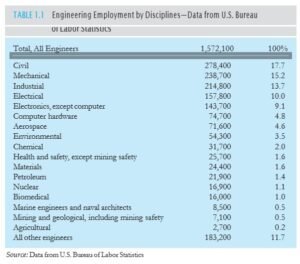Although the activities of engineers are quite varied, there are some personality traits and work habits that typify most of today’s successful engineers.
- Engineers are problem
- Good engineers have a firm grasp of the fundamental principles of engineering, which they can use to solve many different
- Good engineers are analytical, detailed oriented, and crea
- Good engineers have a desire to be lifelong For example, they take continuing edu- cation classes, seminars, and workshops to stay abreast of innovations and new technologies. This is particularly important in today’s world because the rapid changes in technology will require you as an engineer to keep pace with new technologies. Moreover, you will risk being laid off or denied promotion if you are not continually improving your engineering education.
- Good engineers, regardless of their area of specialization, have a core knowledge that can be applied to many Therefore, well-trained engineers are able to work outside their area of specialization in other related fields. For example, a good mechanical engineer with a well- rounded knowledge base can work as an automotive engineer, an aerospace engineer, or as a chemical engineer.
- Good engineers have written and oral communication skills that equip them to work well with their colleagues and to convey their expertise to a wide range of
- Good engineers have time-management skills that enable them to work productively and efficiently.
- Good engineers have good “people skills” that allow them to interact and communicate effectively with various people in their For example, they are able to commu- nicate equally well with the sales and marketing experts and their own colleagues.
- Engineers are required to write These reports might be lengthy, detailed technical reports containing graphs, charts, and engineering drawings, or they may take the form of brief memoranda or executive summaries.
- Engineers are adept at using computers in many different ways to model and analyze various practical
- Good engineers actively participate in local and national discipline-specific organizations by attending seminars, workshops, and Many even make presentations at professional meetings.
- Engineers generally work in a team environment where they consult each other to solve com- plex They divide up the task into smaller, manageable problems among them- selves; consequently, productive engineers must be good team players. Good interpersonal and communication skills are increasingly important now because of the global market. For example, various parts of a car could be made by different companies located in different countries. In order to ensure that all components fit and work well together, cooperation and coordination are essential, which demands strong communication skills.
Clearly, an interest in building things or taking things apart or solving puzzles is not all that is required to become an engineer. In addition to having a dedication to learning and a desire to find solutions, an engineer needs to foster certain attitudes and personality traits.
These are some other facts about engineering that are worth noting.
- For almost all entry-level engineering jobs, a bachelor’s degree in engineering is According to the U.S. Bureau of Labor Statistics:
- The starting salaries of engineers are significantly higher than those of bachelor’s-degree grad-
uates in other fields. The outlook for engineering is very good. Good employment opportunities are expected for new engineering graduates during 2010 –2018.
- Most engineering degrees are granted in electrical, mechanical, and civil engineering, the parents of all other engineering
- In the year 2008, engineers held 6 million jobs (see Table 1.1).
The distribution of employment by disciplines is shown in Table 1.1.
As mentioned previously, engineers earn some of the highest salaries among those holding bachelor’s degrees. The average starting salary for engineers is shown in Table 1.2. The data shown in Table 1.2 is the result of the July 2009 survey conducted by the National Association of Colleges and Employers.
According to the U.S. Bureau of Labor Statistics, in the Federal Government sector, mean annual salaries for engineers ranged from $126,788 in ceramic engineering to $81,085 in agri- cultural engineering in March 2009.






